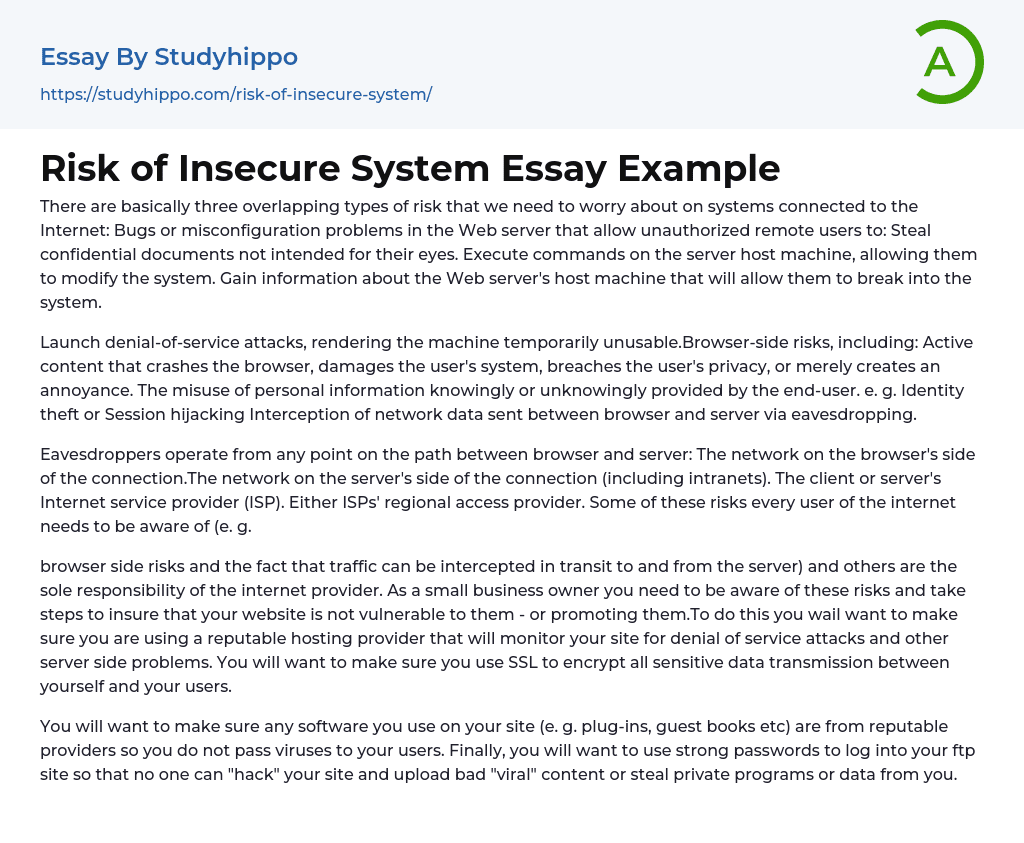There are basically three overlapping types of risk that we need to worry about on systems connected to the Internet: Bugs or misconfiguration problems in the Web server that allow unauthorized remote users to: Steal confidential documents not intended for their eyes. Execute commands on the server host machine, allowing them to modify the system. Gain information about the Web server's host machine that will allow them to break into the system.
Launch denial-of-service attacks, rendering the machine temporarily unusable.Browser-side risks, including: Active content that crashes the browser, damages the user's system, breaches the user's privacy, or merely creates an annoyance. The misuse of personal information knowingly or unknowingly provided by the end-user. e. g. Identity theft or Session hijacking Interception of network data sent between browser
...and server via eavesdropping.
Eavesdroppers operate from any point on the path between browser and server: The network on the browser's side of the connection.The network on the server's side of the connection (including intranets). The client or server's Internet service provider (ISP). Either ISPs' regional access provider. Some of these risks every user of the internet needs to be aware of (e. g.
browser side risks and the fact that traffic can be intercepted in transit to and from the server) and others are the sole responsibility of the internet provider. As a small business owner you need to be aware of these risks and take steps to insure that your website is not vulnerable to them - or promoting them.To do this you wail want to make sure you are using a reputable hosting provider that will monitor your site for denial of service attacks an
other server side problems. You will want to make sure you use SSL to encrypt all sensitive data transmission between yourself and your users.
You will want to make sure any software you use on your site (e. g. plug-ins, guest books etc) are from reputable providers so you do not pass viruses to your users. Finally, you will want to use strong passwords to log into your ftp site so that no one can "hack" your site and upload bad "viral" content or steal private programs or data from you.
- Networking essays
- Telecommunication essays
- Network Topology essays
- Telecommunications essays
- Electronics essays
- Computer Science essays
- Consumer Electronics essays
- Enterprise Technology essays
- Hardware essays
- Robot essays
- engineering essays
- people search essays
- Modern Technology essays
- Impact of Technology essays
- Cloud Computing essays
- Operating Systems essays
- Information Technology essays
- Data Analysis essays
- Information Age essays
- Smartphone essays
- Cell Phones essays
- Camera essays
- Computer essays
- Ipod essays
- Mobile Phones essays
- 3g essays
- Bluetooth essays
- Cell Phones in School essays
- Computer File essays
- Desktop Computer essays
- Servers essays
- Data collection essays
- Graphic Design essays
- Data Mining essays
- Cryptography essays
- Internet essays
- Network Security essays
- Android essays
- Computer Security essays
- World Wide Web essays
- Website essays
- Computer Network essays
- Application Software essays
- Computer Programming essays
- Computer Software essays
- Benchmark essays
- Information Systems essays
- Email essays
- Hypertext Transfer Protocol essays
- Marshall Mcluhan essays




